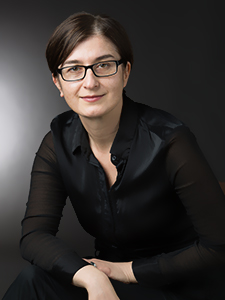From Conflict to Collaboration – A Faculty Perspective
Slavica Jakelić
Assistant Professor of Humanities and Social Thought
 Most scholarly research on the relationship between religion and secularism focuses on conflict, says Christ College faculty member Slavica Jakelić, but there is plenty of evidence that religious and secular organizations can not only coexist, but act in concert to promote shared values.
Most scholarly research on the relationship between religion and secularism focuses on conflict, says Christ College faculty member Slavica Jakelić, but there is plenty of evidence that religious and secular organizations can not only coexist, but act in concert to promote shared values.
“Some of the most powerful and successful social movements of the 20th century resulted from collaborations between religious and secular humanists,” says Professor Jakelić.
Her current research project focuses on three of those collaborations: the antiapartheid movement, the Solidarity movement in Communist Poland, and the early 20th-century labor movement in the United States.
“For a long time, the dominant understanding among social theorists was a narrative of progress, in which secularism becomes more and more dominant in a power struggle with religion,” says Professor Jakelić. Several generations of sociologists predicted a gradual withering away of religion and religious institutions – but history doesn’t seem to be bearing those predictions out, she says.
“Social movements are a way of understanding religious-secular relations outside of the formal political and legal arenas in which everything is about power. I’m looking at the religious and secular leaders of social movements in the 20th century, and what I see is that their actions are not only about empowerment but also about sacrifice; they understand well their ideological differences but they also recognize the shared ideals of justice. So, yes, the religious and secular people in the social movements worked together for strategic reasons but they also did it in the name of common ideals ” Professor Jakelić says.
“My work generally falls under the rubric of historical sociology,” she notes. “I look at the ways things that happen in the past shape how we think about today. I’m interested in identifying larger patterns, which is why I’m doing a study of several cases instead of just one.”
Professor Jakelić, who holds degrees in sociology, theology, and religious studies, feels at home in the collegial, interdisciplinary atmosphere of Christ College. “I think that in order to understand religion more fully, it is necessary to go beyond the boundaries of a single discipline.”
“I am currently co-teaching a class called ‘Religion, Secularism, and Modernity’ with Ian Clausen, a colleague who is a theological ethicist. We are looking at where the notion of religion vs. secularism as conflict comes from, and what we can do to get beyond it.”
“My research is reflected profoundly in my teaching, of course,” Professor Jakelić says. “Our students at Christ College are very interested in this topic. Most of them come from religious backgrounds; some are looking very closely at their own religious identities, some are not religious, and most are interested in social justice.”
“At the same time, my work with students is important to my research because they ask fresh questions. They ask questions from the point of view of their generation, which is something I can’t find in books or at academic conferences.”
So far, says Professor Jakelić, “students are confirming some of my intuitions about these past cases. This is a generation that recognizes polarization as a problem. And, as they are developing and affirming their own religious and non-religious identities, they want to open the possibility of encountering others who are different.”
“It’s my hope, through these students, that we don’t have to live in such a polarized world. Students that I encounter don’t like conflict, but they realize that it’s important to understand difference. One of the things I hope to accomplish is to show them that open disagreement can be done productively and that sustaining a level of conflict is important for healthy democracies. When you learn about and disagree with someone’s convictions, you learn something about yourself and you learn something about the other. In the final instance, you can hopefully find ways to work together to solve concrete problem.”